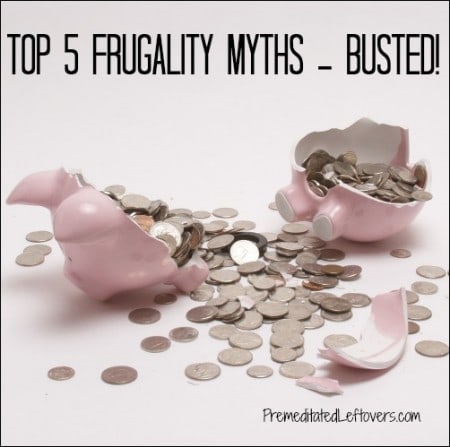
Top 5 Frugality Myths
Quality
It’s true that you can save money by buying similar items for a cheaper price by selecting off brands or buying from discounters. However, the idea that these items will always be of similar quality is a myth. In many cases, such as with generic over the counter medications, you can easily look at the active ingredients and find a similar product for less money, which is great. In other cases, you unfortunately often get what you pay for. Learn to be frugal where it benefits you, and spend more when you’re looking for quality. Items like furniture, certain foods and clothing can have significant differences in quality when choosing more frugal options over name brand items.
Fix it Yourself
The idea that fixing something yourself is always going to save you money is a myth. In minor cases like replacing a small part on an appliance, or installing a basic fixture in your home, doing it yourself can save you money. In more complex cases, such as with plumbing, broken appliances and electrical work, fixing the item yourself, especially if you do not have experience in its repair, can cost you significantly more. Costs quickly escalate as you not only replace the item that’s broke, but also the new item you broke or damaged while trying to fix the first broken item yourself. In severe cases, you may also be paying to fix other damages as well, such as with fires or floods due to improperly performed do-it-yourself projects.
Bulk Waste
The idea that buying in bulk will always save you money is another common frugality myth. Buying in bulk items that you use on a regular basis, or got through a lot of, can save you money. However, buying in bulk just because it’s cheaper can quickly backfire, especially on perishable goods like fruits and vegetables. Plan to limit your bulk purchases to only those with long shelf lives, or to items that you will actually use in the near future. This planning prevents both physical waste and waste of your money.
Coupons
Couponing is a great way to save substantial amounts of money on items you buy from food to toothpaste. However, the idea that all coupons save you money is another myth. Like bulk shopping, purchasing too much of an item, or buying items you may never use just because you have a coupon can result in waste. Often coupons leave you with large portions of storage space being taken up by items you’ll never use. Limit coupon use to items you actually buy on a regular basis, or that you know you will use before the item expires, especially when using coupons for perishables.
Denying Yourself
A prominent myth about frugality is that being frugal requires denying yourself the things you want. In some individual cases this my be true, but typically only by personal choice. Living a frugal lifestyle can be viewed not only as a way to spend less money, but also a way to save money. This money can be put away for items that mean more to you and your family, whether that be purchasing a home, a car or even planning a vacation. Living a frugal lifestyle does not have to mean denying yourself anything, it just means you’re prioritizing what matters more to you.
While a frugal lifestyle can be rewarding, make sure you thoroughly research how you plan to actually live frugally. This preparation will prevent you from following myths that save money in the short term, only to lose money over time through waste or unused products.

R says
I agree with all of these! I remember having a pet bag of jasmine rice for years. Why I thought a single person needed a 10 bag is still a mystery. Also, my sister, who worked for a marking company, was working on an ad campaign for a top grocery store. They pitched a slogan for the store’s brand name with the phrase “quality ingredients” and the store asked them not to use the word “quality.” I have never bought that store brand!